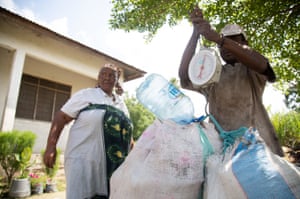-
A waste picker collects plastic bottles on a burning dump in Dar es Salaam, Tanzania. Multinational companies such as Coca-Cola, PepsiCo, Nestle and Unilever produce quantities of single-use plastic in countries where there are few recycling facilities, so it is burned, producing millions of tonnes of carbon dioxide.
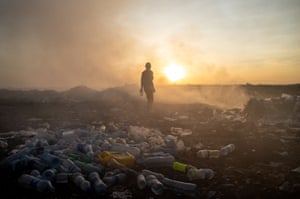
-
Royda Joseph, 32, a mother of three, lives with her family in a fly-infested area next to the biggest rubbish dump in Dar es Salaam. ‘The smoke is so dark and huge that you can’t see the person in front of you or the house next to you,’ she says.
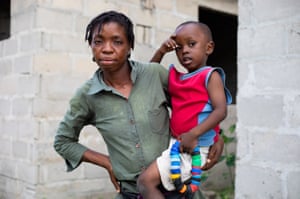
-
The university dump in Dar es Salaam. Tearfund is calling on multinationals to change to reusable packaging. Taking a sample of six developing countries, the NGO estimates the burning of plastic packaging creates 4.6m tonnes of carbon dioxide – equivalent to the emissions from 2m cars.
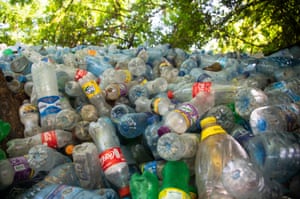
-
‘It’s normal to get some coughing and breathing problems because of the smoke,’ says Kelvin Swai,* pictured, who works on a dump in Dar es Salaam that burns 24 hours a day.
*Name changed to protect identity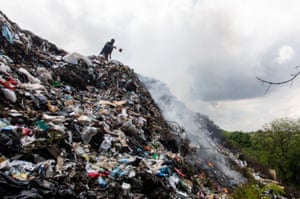
-
-
Agness Zakayo*, 47, uses an empty plastic Unilever soap sachet to light charcoal as she can’t afford kerosene. Her family ‘all get a bit of coughing like something choking in your throat’.
*Name changed to protect identity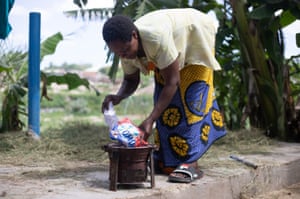
-
A Dar es Salaam shop front. Coca-Cola is by far the worst polluter of the four companies Tearfund names, with emissions more than the other three combined. ‘These companies have a moral responsibility for the disposal of the products they continue to pump into developing countries’, says Dr Ruth Valerio of Tearfund.
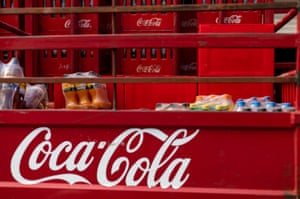
-
Tearfund calculates that Coca-Cola, Nestle, Pepsi-Co and Unilever are responsible for more than half a million tonnes of plastic pollution every year in just six countries, China, India, the Philippines, Brazil, Mexico and Nigeria.

-
Ramadhan Mohamed, a waste picker, collects plastic bottles along the riverbank. ‘The bottles block the passage of water, so they can cause floods,’ he says. Sometimes, when the river is in spate, collectors are drowned.
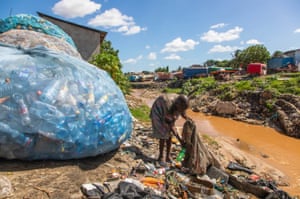
-
-
Gloria Mafole works as advocacy and policy analyst for Tearfund’s partner, the Church Council of Tanzania. She is challenging the four multinationals to inform consumers, so that they know burning plastic will harm them and the environment.
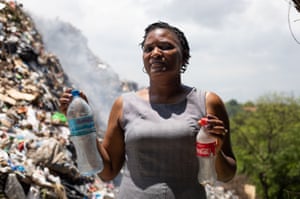
-
Johnson Pita, 47, makes a living collecting 700-1,000 plastic bottles from the river every day in the Kigogo area of Dar es Salaam. When he was a boy, the water was clear and full of fish, but now ‘every day the increase of the waste is huge’ and he suffers stomach pains.

-
‘Some people urinate in the plastic bottles,’ says Miriam Abdalah*, 38, who lives with her five children in the Tabata area of Dar es Salaam, next to a river where a lot of waste is thrown. ‘Kids will look at the bottle and the colour and they think it is something to drink.’
*Name changed to protect identity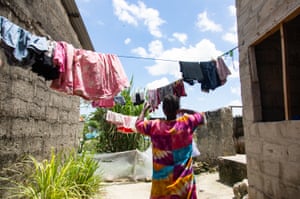
-
‘The companies should find a way that makes it safer for their waste to be collected,’ says Irene Kanyugwa, 28, a midwife. Her clinic is next to Kinyamwezi, the biggest dump site in Dar es Salaam. ‘When the dump is on fire there are more people with respiratory problems, pneumonia, and asthma.’
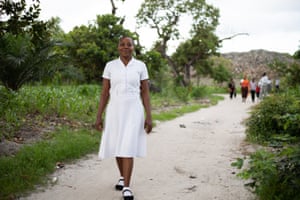
-
-
Victoria Mpoyola, 62, lives behind Kinyamwezi and buys and sells used plastic bottles. She has noticed an increase in the volume of waste, and says: ‘The smoke is a mixture of very bad gases, sometimes poisonous things as well.’
